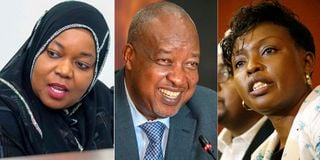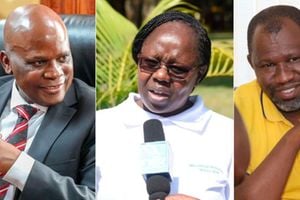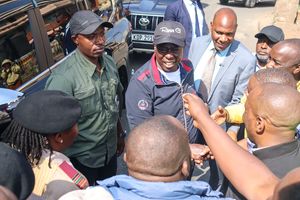Breaking News: Former Lugari MP Cyrus Jirongo dies in a road crash

From left: Governors Fatuma Achani (Kwale), Amos Nyaribo (Nyamira) and Evalyn Aruasa.
Broken pre-poll deals, succession politics and battle for control of billions are behind the perennial falling out between governors and their deputies since the advent of devolution.
The fierce supremacy battles have been characterised by accusations of graft, sponsored impeachments and being relegated to bystanders in the running of county affairs.
However, at the heart of the power struggles has been failure to implement pre-election pacts, including sharing of key appointments and succession politics.
With the governor wielding the ultimate power as the county supremo, the DG position has become a revolving door with few county bosses retaining their running mates in subsequent elections.
The position is turning out to be a poisoned chalice for some of its holders who have found themselves out in the cold, sidelined or rendered mere bystanders.
Since 2013, only 15 DGs have been retained by their bosses in the subsequent election cycle with the rest parting ways amid clash of egos.
Among the pioneer deputies, Fatuma Achani and Amos Nyaribo stand out as the only DGs who were not only retained by their bosses but successfully succeeded them, albeit in different circumstances.
Nyaribo succeeded the late John Nyangarama following the former governor’s sudden death in 2020 and is now serving his second term. Adelina Mwau (Makeuni), Trans Nzoia’s Stanley Tarus, Evalyn Aruasa (Narok), Hamilton Orata (Homa Bay), Migori’s Nelson Mwaita, Joash Maangi (Kisii), Philip Kutima (Kakamega) and Daniel Kiplagat (Uasin Gishu) managed to successfully seek re-election with their bosses.
However, it was not all rosy between Maangi and his boss, James Ongwae as the two were involved in on-and-off squabbles. But even with the bickering, Ongwae decided to retain his deputy in the 2017 elections for political balancing and the “marriage of convenience” had its ups and downs in the second term.
The high turnover in 2017 is a clear sign all was not rosy between the governors and their deputies with the most tantalising and dramatic of the fallouts being the long-running saga between former Machakos Governor Alfred Mutua and his deputy Bernard Kiala.
Dr Mutua accused his deputy of undermining him, being corrupt and even seeking sexual favours from “small girls” with the promise of giving them employment in the county government.
Hitting back, Kiala levelled the same charges against his boss, insinuating that Dr Mutua, was worse in seeking favours from “small girls”. The battle ended up with Kiala being impeached on corruption charges only to be saved by the Senate which overturned the impeachment.
But when he resumed work, he found his office had been raided and all furniture removed. He was also stripped of his ministerial position as the head of the county executive of Public Service, Labour and Information and Communications Technology (ICT).
Another ugly fight was in Murang’a County between Governor Mwangi wa Iria and his deputy Augustine Monyo. Monyo reported to work only to find his office being demolished and his personal belongings strewn all over the floor.
His official vehicle was intercepted by the police for using private registration numbers. He was accused of working with MCAs to oust Wa Iria. The governor survived an impeachment motion, which he accused Monyo of supporting.
Monyo, on the other hand, accused the governor of overseeing massive corruption. Wa Iria would go on to replace Monyo with James Maina in the run-up to the 2017 elections.
On the other hand, Dr Mutua replaced his deputy with Francis Maliti, his former County Executive Member for Roads, in 2017. Kiala even went on to try to unseat his former boss in that election as an independent candidate.
Orata told the The Weekly Review that competing interests and clashing personalities are behind the bad blood between governors and their deputies. He said that most of the clashes boiled down to people wanting contracts through proxies resulting in competing interests that ended up being a source of conflict.
“For you to work comfortably together, one must divorce him or herself from competing interests in between apart from work. It must be devoid of wanting to do business where you work,” said Orata.
“For me, I had no interest in doing business with my county the same as the governor so it raised us to the pedestal where we could work cordially.”
Further, he said that since there is no law which can guide relationships, the two officers must understand each other to work harmoniously.
“It depends on one’s ability to understand his boss and his ability to reciprocate that understanding. In other words, your boss must know you are not competing for positions and at the same time he must know you represent a constituency and respect that,” he said.
Tarus added that some of the battles are because of over-ambition by the deputies who think they can replace their bosses.
He also added that some officers surrounding the governors can also fuel the fights by undermining the deputy governors.
“I was lucky to have a technocrat as a governor leading to building a gentleman’s agreement in the process. He assigned me duties and even allowed me to chair some Cabinet meetings,” he said.
For the next crop of governors, only five governors retained their deputies in subsequent election cycles. Kajiado Governor Joseph Ole Lenku has retained Martin Moshisho, Dr Yulita Mitei in Nandi County, Solomon Riwe in Marsabit, Shadrack Rotich in Bomet and James Gesami in Nyamira.
Isiolo DG Abdi Issa fell out with his boss, Mohamed Kuti less than a year after assuming office and was immediately stripped of his role as Health executive by the governor. Issa was accused of targeting staff members from certain clans that leaned towards Kuti in the 2017 elections.
In Kirinyaga, Deputy Governor Peter Ndambiri had a frosty working relationship with the governor’s supporters demanding Ndambiri’s resignation accusing him of being behind the plot to impeach her.
But a defiant Ndambiri refused to step aside, saying he does not serve at the pleasure of his boss. Waiguru would later be impeached by MCAs only to survive at the Senate.
Ndambiri was replaced by David Wachira in the 2022 elections. Makueni Senator Dan Maanzo argued the relationship between governors and their deputies is mostly political as the two pool political resources in order to win an election.
He said the Senate is currently handling 21 cases of bad blood between governors and their deputies with the latter being the worst hit as there is no law directly protecting them.
“Some governors have some fear that the deputy might cook something against them as the law states that the deputy governor is next in line in case of the governor being removed from office or leaves office,” Maazo said.
“You could find a DG instigating the removal of a governor. What happened to Kawira Mwangaza is a wake-up call to many governors,” he added.
Machakos Deputy Governor Francis Mwangangi pointed out that more than three-quarters of his counterparts don’t work well with their bosses. Mandera Deputy Governor Dr Ali Maalim added that a great majority of DGs are suffering in silence and are at the mercy of their bosses to decide what roles they will perform.
He said governors choose their deputies because the latter command certain constituencies and bring something to the table. However, they end up not being treated commensurately in terms of the share of running of the county government.
“Unfortunately, once you come into office, most governors forget this and the deputies get isolated. Only a handful of us have a good working relationship with the governors,” Dr Maalim said.
Elgeyo Marakwet DG Professor Grace Cheserek wondered why the DGs are very important during campaigns but get abandoned immediately when the governor assumes office.
She pointed out that 90 percent of them don’t have executive orders of what they are supposed to do or designated budget for their offices despite being the second senior most State officer in the county.
“You are lumped up in the office of the governor and you have to rely on the goodwill of the governor to move around. We are left to read the newspapers and be called flower girls,” said Prof Cheserek.
Last month, the DGs narrated to MPs the harrowing humiliation they have to put up with under their bosses for lack of defined roles in counties. DG Mitei recounted how more often than not some of them are not informed of county government meetings just to ensure they are given total blackout.
As part of the humiliation parade, she said roles they would have performed are delegated to spouses of the county governors, county secretaries or county executive committee members; rendering them mere “flower girls”.
In other instances, some are denied official vehicles while those lucky to have assigned vehicles are denied fuel for the same. Mitei said that about 90 percent of the 47 deputy governors have real budgetary allocations to run their offices.
Appearing before the Senate Devolution and Intergovernmental Relations committee, she said some county bosses view the DG seat as an unnecessary appendage yet they campaigned together.
Another DG told the committee chaired by Wajir Senator Mohamed Abass how at one time goons were unleashed on him when he tried to attend a county Cabinet meeting without invitation after falling out with his boss.
“During the General election we are elected jointly but when we come to office we can no longer work together well despite the role we played to come to office,” said Laikipia Deputy Governor Reuben Kamuri, who also doubles as the chairperson of the Deputy Governors Caucus.
“We need to fix the lacuna in the law in regard to functions of deputy governors once and for all. If an officer is not facilitated, how do we expect them to discharge their mandate?” posed Ms Mitei.
Lifting the lid on the uneasy relationship between the two top county officials, some of the DGs recounted how they are demeaned with some governors delegating duties they should have performed to the boss’s personal assistant.
The DGs want the Senate to push for the amendment of the County Governments Act to have clearly defined roles with budgetary allocations and subsequently entrenched in law to end the perennial battles with their bosses.
Some of the proposals include appointing a chief officer to manage the affairs of the office of the DG, coordinate disaster risk management, and plan and supervise the implementation of disaster management and response within the county.
Others include supervising the implementation of County government development projects and resolutions across all departments in the county, chairing all the county executive sub-committees as well as assisting the governor in the coordination and supervision of county government sectors. This is in addition to performing any other function as may be assigned by the governor.
At the height of their fallout with his boss, Kericho Deputy Governor Fred Kirui accused his boss, Governor Erick Mutai of reneging on a pre-election deal on sharing of county appointments leading to a bitter feud.
Kirui claimed the two had agreed on sharing of appointments on a 60:40 basis but as soon as they took the oath of office, the gentleman's agreement was thrown out of the window. He accused the governor of failing to stick to his side of the agreement and sidelining him in the management of the county affairs.
“During our discussions, we signed an agreement that when we win elections, we would form the government together. He was expected to take care of 60 percent as I remained with 40 percent, the agreement is before a commissioner of oaths. However, I got zero shares,” said Kirui.
But the Kericho agreement appears not to have been an isolated case with Trans Nzoia Deputy Governor Philomena Kapkory also accusing Governor George Natembeya of going back on a pre-poll deal leading to bad blood between the two.
“I remember I was to get 30 percent in terms of government sharing, but he never gave me even one position. I've never even employed a cat in Trans Nzoia County,” said the DG.
“When I inquired, he told me that my community and the larger Kalenjin did not vote for him the way he expected despite getting 18,000 votes from the Sabaots,” she added.
Shining the spotlight on the troubled relationship between the two most powerful leaders in the county, at least seven county bosses and their deputies fell out within months of the August 9, 2022 elections.
Kisii Deputy Governor Robert Monda ended up paying the ultimate price in his battle with his boss Governor Simba Arati after being impeached. Siaya DG William Oduol also almost went Monda’s way only to be saved by the Senate, but he has since been barred from the county’s affairs with his relationship with Governor James Orengo at the point of no return.
In Meru, besieged Governor Kawira Mwangaza has a frosty relationship with her deputy Isaac Mutuma with the two no longer seeing eye-to-eye.
Article 180(5) states that each candidate for election as county governor shall nominate a person who is qualified for nomination for election as county governor as a candidate for deputy governor.
Article 179(4) of the Constitution states that the county governor and the deputy county governor are the chief executive and deputy chief executive of the county, respectively. Section 5 of the Article adds that when the county governor is absent, the deputy county governor shall act as the county governor. But on the ground, things are different.
But Section 32(4) of the County Governments Act, 2012 states when acting in office as contemplated in Article 179(5) of the Constitution, the deputy governor shall not exercise any powers of the governor, to nominate, appoint or dismiss, that are assigned to the governor under the Constitution or other written law.
Sub-section (5) adds that the governor shall not delegate to the deputy governor any of the functions referred to in subsection (4). Governors and their deputies have rarely enjoyed cordial working relationships in the seemingly forced political marriages of convenience. Theirs have been a “marriage” fraught with betrayal, self-interest, broken agreements, and in good times, tolerance.
While the county bosses cannot fire their deputies, they have always had the upper hand in the fights as they wield all the powers.
Section 32(2) of the County Governments Act, 2012 states that the deputy governor shall deputise for the governor in the execution of the governor’s functions. Sub-section (3) adds that the governor may assign the deputy governor any other responsibility or portfolio as a member of the county executive committee.











